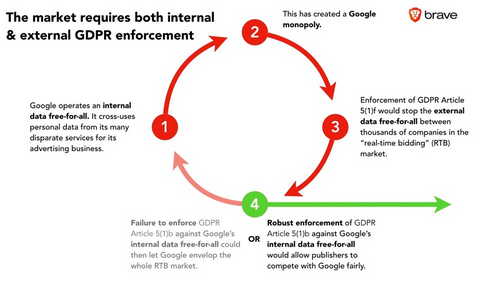In a submission filed with the CMA last week, Brave highlights what it views as gaps in the regulator’s “Online platforms and digital advertising” study. The company also argues that failing to enforce Europe’s rules under the General Data Protection Regulation (GDPR) enables Google’s monopoly in the online advertising market.
The company behind the privacy-oriented browser Brave has set out to convince regulators in the U.K. to end Google’s advertising monopoly in the digital space.
In a filing with the country’s Competition and Markets Authority (CMA), Brave puts forward recommendations on how to “neutralize” the tech giant’s “unfair data advantage.”
Failure to Enforce Data Protection Rules Enables Google’s Monopoly, Brave Warns
The CMA, which is a non-ministerial government department responsible for preventing anti-competitive practices in the United Kingdom, published its interim report in 2019 with several consequent updates. The final report, part of a wider digital strategy aimed at addressing current challenges, should be published by July 2, 2020. The authority was accepting comments on its contents until Feb. 12.
According to its preliminary findings, the digital advertising sector in the U.K. has grown massively, to around £13 billion (almost $17 billion), and is also quite concentrated. Google alone accounted for over 90% of all revenues earned from search advertising the previous year, with revenues of around £6 billion, while Facebook had almost half of all display advertising revenues, reaching more than £2 billion.
Brave insists that a functional real-time bidding (RTB) market, where advertising is bought and sold per number of impressions, requires both internal and external data protection. The company notes that Google’s monopoly is based on its internal data free-for-all, or the use of personal data collected by its many platforms for its advertising business. The enforcement of GDPR is supposed to “neutralize Google’s unfair data advantage” and provide “functional separation” of Google’s businesses.

Texts in the GDPR’s Article 5 postulate that “personal data shall be collected for specified, explicit and legitimate purposes and not further processed in a manner that is incompatible with those purposes”, while its “integrity and confidentiality” should be ensured. Brave also calls for measures against the external data free-for-all between the participants in the RTB market, thousands of companies.
Competition Authority Concerned About Tech Giants Undermining Publishers
Brave’s pro-privacy browser has been designed to allow users to block ads and website trackers in ordure to offer them a faster and more private browsing experience. Within its attention-based rewards ecosystem, users are provided with an option to send cryptocurrency contributions in BAT, the platform’s proprietary Basic Attention Token, to support publishers and content creators. The company was founded by Brendan Eich, creator of Javascript and co-founder of Mozilla, who is now Brave’s chief executive officer.

In its draft report, the U.K.’s Competition and Markets Authority remarks that while the services of platforms such as Google and Facebook appear to be free, consumers do pay for them indirectly by providing their attention and personal data, which is then used to sell digital advertising.
The CMA is concerned about the negative consequences of their market position such as the lack of competition from potential rivals and proper choice for consumers. Higher prices for advertisers translating into more expensive goods and services can be another problem. Furthermore, the regulator points out that the ability of publishers to produce valuable content may be undermined by the tech giants squeezing their revenues and changing search and news algorithms.


